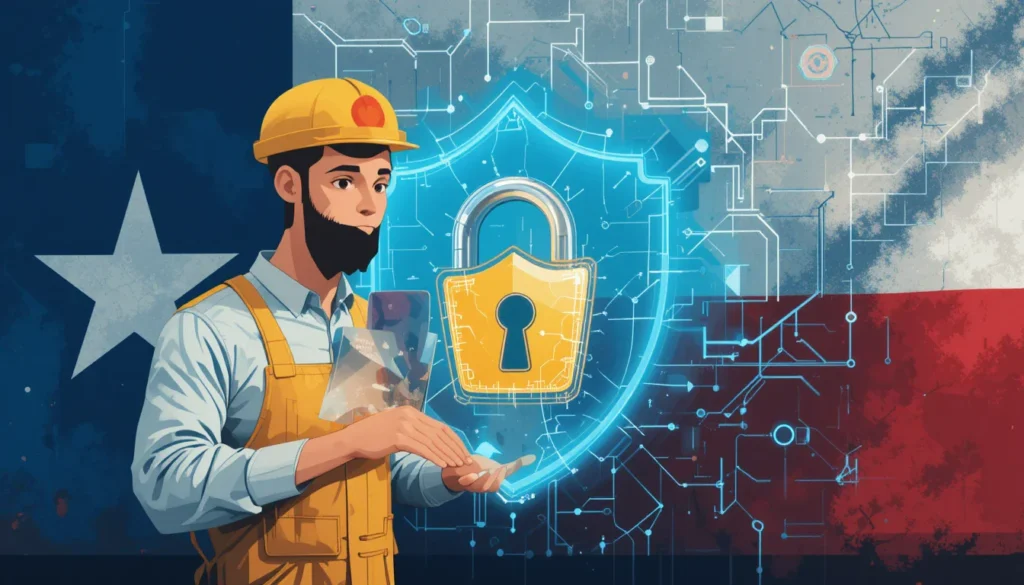Overview
Texas has enacted a powerful new cybersecurity law aimed specifically at safeguarding small businesses from the growing threat of cyberattacks. With data breaches and ransomware attacks on the rise, the law mandates basic security practices, offers free training resources, and enforces reporting obligations to strengthen the cybersecurity posture of small and mid-sized enterprises (SMEs) across the Lone Star State.
Key Facts
- Focus Keyword: Texas Cybersecurity Law
- Signed into law on June 18, 2025 by Texas Governor Greg Abbott.
- Targets small businesses with under 250 employees and under $10 million in annual revenue.
- Law mandates implementation of basic cybersecurity hygiene like multi-factor authentication (MFA), regular updates, and employee awareness training.
- Provides access to state-sponsored cybersecurity training and toolkits.
- Establishes a 24-hour breach notification requirement to state agencies.
- Law becomes effective on January 1, 2026.
What’s Verified and What’s Still Unclear
Confirmed:
- The law applies only to small businesses and not large enterprises.
- Texas Department of Information Resources (DIR) will manage training resources.
- Non-compliance will result in civil penalties, not criminal charges.
Unclear:
- Whether grants or financial assistance will be offered for security upgrades.
- How the state plans to monitor compliance without overburdening businesses.
- Specific third-party vendors approved for cybersecurity assessments.
Timeline of Events
- April 2025: Draft bill introduced by Texas State Senator Jane Kellerman.
- May 2025: Senate Committee unanimously supports the bill.
- June 18, 2025: Signed into law by Governor Abbott.
- Q4 2025: Training modules and awareness campaigns to be rolled out.
- January 1, 2026: Law goes into full effect across Texas.
Who’s Behind It?
The bill was authored by Senator Jane Kellerman, who emphasized the vulnerability of small businesses to ransomware and phishing attacks. Backed by Texas Department of Information Resources, Chamber of Commerce, and SMB advocacy groups, the law is a response to mounting pressure from local businesses impacted by data breaches.
Public & Industry Response
The reception has been largely positive:
- Small business owners appreciate the focus on training and awareness rather than punitive regulation.
- Cybersecurity experts believe it sets a precedent for other states.
- Some privacy advocates worry about the centralization of breach reports, citing surveillance concerns.
What Makes This Law Unique?
Unlike other state laws that focus on consumer protection or large corporations, the Texas Cybersecurity Law is laser-focused on small businesses, which often lack the resources to defend themselves. It provides:
- Free tools and training
- A grace period to meet compliance
- A clear roadmap without overly technical requirements
This bottom-up approach ensures even mom-and-pop shops or solo entrepreneurs are equipped to detect and respond to threats.
Understanding the Basics
Cyberattacks are no longer targeting only major corporations. Small businesses make up over 40% of ransomware victims globally, mainly because they are seen as low-hanging fruit. Texas’ law aims to:
- Increase basic cyber hygiene.
- Prevent financial loss, data theft, and reputational damage.
- Improve statewide cyber resilience.
Key Terminologies:
- MFA (Multi-Factor Authentication): Adds a layer of security beyond a password.
- Phishing: Fake emails used to steal credentials or install malware.
- Patch Management: Regular updates to fix security flaws in software.
What Happens Next?
- Awareness Campaigns: Expect outreach from the Texas DIR and local chambers.
- Training Portals: Launch expected in October 2025.
- Business Cyber Scorecards: Optional tools to self-assess risk levels.
- Other States Watching: Florida, Ohio, and Arizona are reportedly drafting similar small-business laws based on Texas’ framework.
Summary
The Texas Cybersecurity Law marks a major step forward in safeguarding small businesses from the rapidly evolving cyber threat landscape. By emphasizing education, affordability, and proactive defense, it provides a practical and scalable model for cybersecurity regulation. With its January 2026 implementation date, small businesses in Texas now have a clear path to becoming more secure—without needing to break the bank or become tech experts.
